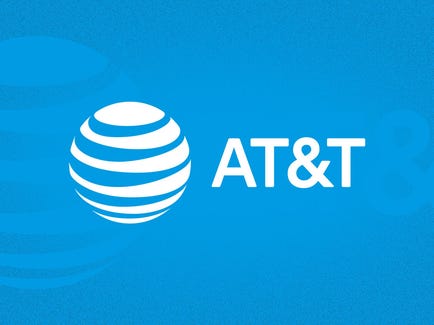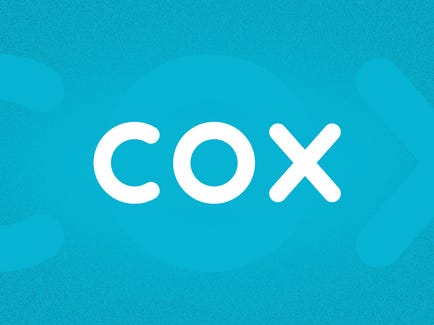AT&T vs. Cox Communications: Two Top Internet Providers Vie for Your Consideration
Are you facing a choice between these companies for your home broadband needs? Here's how to pick the right one for you.


AT&T and Cox. Cox and AT&T. Two internet service providers enter, and only one will leave.
OK, OK, so maybe this isn't quite as dramatic as a literal fight to the death, but there's still a lot to consider if you're comparing the two ISPs -- especially if you're choosing between them for your home's internet connection. In that case, only one of them can indeed win. But which one?
The short answer? It depends. AT&T's fiber plans are some of the best deals you'll find on home internet -- but fiber isn't available everywhere AT&T operates, and AT&T's alternatives are much slower. Meanwhile, Cox's cable plans offer plenty of speed of their own, including gigabit plans available across Cox's entire coverage map -- but there's fine print to watch out for concerning data caps and rising costs.
Locating local internet providers
Keep reading for the longer answer, which includes a close comparison of each provider's plans, prices, terms, availability and customer service track record.
AT&T
If fiber service is available, don't hesitate
Our take - AT&T's internet service is available in 22 states and to nearly 21 million households nationwide. If you can get AT&T Fiber, which features speeds from 300 to 5,000Mbps, you're on solid ground -- it provides excellent value and ranks high on customer satisfaction surveys. However, if you can only get AT&T Internet, a DSL hybrid, you might want to consider other options.
Cox Communications
Decent speeds, but they come at a cost
Our take - While Cox Communications can boast that it's the "largest private telecom provider in the country," that doesn't necessarily make it the best. Cox features gigabit speeds across its entire 19-state footprint (something AT&T can't claim), but there are data caps and some looming price increases down the road that should make customers wary.
AT&T and Cox availability and coverage areas
AT&T is the wider provider here, thanks to its fairly extensive network of ADSL connections and its fixed wireless service, both of which reach a fair number of rural areas. Others across the service map, which covers 21 states in the South, West and Midwest, will find access to AT&T's fiber plans, which are much faster.
Locating local internet providers
According to FCC data last updated in December 2020, AT&T fiber plans were only available across roughly 30% of the provider's footprint. AT&T wouldn't share more recent coverage specifics than that, but a company spokesperson tells us that the number has grown since then and continues to increase.
As for Cox, the company sells the same cable internet plans wherever it offers service. Coverage is much more focused than AT&T and mostly limited to urban and urban-adjacent areas scattered across 19 states. Among other areas, coverage between the two providers overlaps in the following cities:
- Fayetteville, Arkansas
- Irvine, California
- San Diego, California
- Gainesville, Florida
- Macon, Georgia
- Topeka, Kansas
- Wichita, Kansas
- Baton Rouge, Louisiana
- New Orleans, Louisiana
- Cleveland, Ohio
- Oklahoma City, Oklahoma
- Tulsa, Oklahoma
AT&T vs. Cox: Plans, speeds and monthly costs
So what do AT&T and Cox charge for home internet service, and how do their selection of speeds and plans stack up? Let's take a look, starting with AT&T:
AT&T home internet plans
| Plan | Max speeds | Promo price (first 12 months) | Regular monthly cost (after 12 months) | Equipment fee | Data Cap |
|---|---|---|---|---|---|
|
AT&T Fixed Wireless Read full review | 25Mbps download, 1Mpbs upload | $70 | $70 | None | 350GB |
|
AT&T Internet 10 Read full review | 10Mbps download, 1Mpbs upload | $55 | $70 | None | 1TB |
|
AT&T Internet 18 Read full review | 18Mbps download, 1Mpbs upload | $55 | $70 | None | 1TB |
|
AT&T Internet 25 Read full review | 25Mbps download, 2Mpbs upload | $55 | $70 | None | 1TB |
|
AT&T Internet 50 Read full review | 50Mbps download, 10Mpbs upload | $55 | $70 | None | 1TB |
|
AT&T Internet 100 Read full review | 100Mbps download, 20Mpbs upload | $55 | $70 | None | None |
|
AT&T Fiber - Internet 300 Read full review | 300Mbps download, 300Mpbs upload | $55 | $55 | None | None |
|
AT&T Fiber - Internet 500 Read full review | 500Mbps download, 500Mpbs upload | $65 | $65 | None | None |
|
AT&T Fiber - Internet 1000 Read full review | 940Mbps download, 880Mpbs upload | $80 | $80 | None | None |
|
AT&T Fiber - Internet 2000 Read full review | 2Gbps download, 2Gbps upload | $110 | $110 | None | None |
|
AT&T Fiber - Internet 5000 Read full review | 5Gbps download, 5Gbps upload | $180 | $180 | None | None |
With AT&T, your monthly rate will range from $55 to $180 per month, depending on your plan and, in some cases, whether or not you're in your first year of service (when some plans come with a discount). Also, keep in mind that if you're in a market where AT&T Fiber is available, you'll have access to the company's fastest plans and best rates, including new multigigabit offerings.
OK, one down -- now let's look at what Cox offers:
Cox home internet plans
| Plan | Max. download speed | Max. upload speed | Monthly equipment rental fee | Regular monthly rate (no contract) | Monthly promo rate (with contract) | Monthly rate after one year | Monthly data cap |
|---|---|---|---|---|---|---|---|
| Starter 25 | 25Mbps | 3Mbps | $13 (skippable) | $40 | $30 | $45 | 1.25TB |
| Essential 50 | 50Mbps | 3Mbps | $13 (skippable) | $50 | $40 | $66 | 1.25TB |
| Preferred 250 | 250Mbps | 10Mbps | $13 (skippable) | $70 | $60 | $84 | 1.25TB |
| Ultimate 500 | 500Mbps | 10Mbps | $13 (skippable) | $90 | $80 | $100 | 1.25TB |
| Gigablast | 940Mbps | 35Mbps | $13 (skippable) | $110 | $100 | $120 | 1.25TB |
Cox plans range in price from $30 per month to as high as $120 per month, depending on the specific plan and whether or not you're still in your first-year promo period. The monthly equipment rental fee of $13 is an additional charge you don't face with AT&T, but Cox lets you skip it by using your own equipment, which is a nice option that can save you money over the long run.
Just be sure to note the higher-than-average price jumps with Cox. When you sign up, you can choose the regular rate or save $10 by choosing a promo rate with a one-year service contract. Either way, your bill will go up at the end of 12 months, sometimes by as much as $26. On average, the Cox price jump from the promo rate to the after-contract rate is $21. With AT&T, the average price jump for ADSL plans is $15 -- and no 12-month jump at all for AT&T Fiber and AT&T fixed wireless.
Is AT&T or Cox a better home internet value?
If AT&T's fiber plans are available at your address, you should strongly consider signing up because they offer some of the best value on home internet from any provider we've evaluated.
For instance, AT&T's 300Mbps fiber plan costs just $55 per month, which is just over 18 cents per Mbps. Compare that with Cox and you'll see that there's no comparison: the 250Mbps Cox plan falls short on the download speed and has a fraction of the upload speed. It also costs $60 per month during the first year (24 cents per Mbps) and $84 per month after that (34 cents per Mbps) -- and that's only if you're able to skip the equipment rental fee. AT&T's other fiber speed tiers offer even better value relative to the competition.
If AT&T doesn't offer fiber plans in your area, you'll have to settle for the company's fixed wireless service or its ADSL plans, a hybrid technology that combines a phone-line-based digital subscriber line with copper wiring. The fastest of these plans offers download speeds of up to 100Mbps for $55 per month during the first year (55 cents per Mbps) and $70 per month after that (70 cents per Mbps). In that case, the 250Mbps Cox plan I mentioned above would be the better value, with faster speeds for a lower price per Mbps.
AT&T Fiber is the best deal here by far, but Cox's cable internet offers slightly better value than AT&T's fixed wireless and ADSL plans, despite costing a bit more.
What sort of fees and terms should I expect from AT&T and Cox?
Ah, yes. Fees and terms. Terms and fees. Two will enter... wait, I already did that, and it doesn't even make sense here.
Unfortunately, terms and fees are by no means mutually exclusive, and when it comes to home internet, they shall never, ever fight each other to the death. You'll find plenty of each with both AT&T and Cox -- here's the rundown:
Installation fees
Both providers charge a one-time fee of $100 for professional installation. Cox lets you skip the fee by requesting an Easy Connect self-installation kit, which guides you through the setup process without needing a technician. AT&T offers a free self-installation kit, too, but it isn't available everywhere, so you'll need to check online to see if it's an option at your address.
AT&T no longer charges an additional fee to rent its modem/router gateway device.
Equipment fees
As mentioned before, Cox charges an equipment rental fee -- $13 per month for its Panoramic Wifi gateway. Cox lets you skip the fee by using your own Cox-approved modem, but over at AT&T, the company's gateway device is included in the monthly price.
Both providers offer optional range extenders that you can pair with the gateway to expand the range of your network. With AT&T, each one costs $50, but with Cox, they cost $130. Given that you'll also be paying $13 per month for the gateway, opting for a mesh router of your own is a much better way to go.
Something else to keep in mind about Cox's Panoramic Wifi gateway is that it will broadcast a second network separate from yours that other Cox customers can connect to as part of the company's network of public hotspots. The feature is enabled by default.
Cox says that it won't affect your home's internet speeds or data usage, but I still wouldn't blame you if you wanted to turn that network off. You'll need to log in to your Cox account and head to the privacy settings to do so.
AT&T says no to contracts, but Cox will try to hook you in for at least a year
AT&T doesn't enforce contracts with its internet plans, but Cox adds in a one-year contract if you opt for the promo rate when you sign up, which knocks $10 off your bill during that first year. If you cancel your service before that contract is up, you'll be charged an early termination fee of $120. If you go with one of Cox's unlimited data bundles, you'll need to accept a mandatory two-year service contract. In that case, canceling your service early will cost you $240.
Data caps compared between AT&T and Cox
Both providers enforce them, but with a couple of key differences.
With AT&T, the fiber plans don't have any data cap, but the ADSL and fixed wireless plans do. Specifically, the cap is set at 1TB (1,000GB) of data per month, and if you use more than that, you'll be charged an extra $10 for each 50GB of excess, up to a maximum monthly penalty of $100.
Cox, meanwhile, enforces a data cap on all of its plans, and the penalties are the same as AT&T -- $10 for every 50GB of excess data usage, up to a maximum of $100. However, Cox sets its data cap higher than AT&T at 1.25TB (1,280GB), and the company will give you a mulligan and waive all of your penalties the first month you exceed it. That makes Cox's caps a bit more manageable than AT&T's -- and it also means that Cox's unlimited data bundles, which remove the cap for a semi-inflated additional fee that includes other services at full price, probably aren't worth it for most customers.
According to the ACSI's latest survey, AT&T is tied at the top with Verizon for customer satisfaction among ISPs. Cox comes in several points lower, and a couple of points below the industry average.
How do AT&T and Cox stack up for customer satisfaction?
Internet providers have never been popular, but AT&T consistently ranks near the top among them. According to the American Customer Satisfaction Index, AT&T ranked at the top with 71 out of 100, six points above the category average of 65 and tied with Verizon. Meanwhile, Cox came in with a slightly below-average score of 63, though this was two points better than last year.
Meanwhile, J.D. Power ranks internet providers for customer satisfaction across four separate regions in the US -- and AT&T was the top-rated provider in two of the three regions it was included in, earning category-leading scores of 732 out of 1,000 in the North Central and 753 in the South region. Cox was a more uneven finisher in the three regions where it was scored, earning below-average ratings of 708 in the East, 707 in the South and 696 in the West.
And the winner is... AT&T's fiber plans
If AT&T Fiber is available at your address, consider it your top option (and count yourself lucky). With excellent value, fast speeds and strong customer satisfaction scores, those fiber plans are some of the best in the industry, and you won't need to sign a contract or worry about a data cap.
That said, AT&T's fixed wireless and ADSL plans are much less competitive, especially when you compare them with the fast download speeds available from a cable provider like Cox. Though Cox's plans are the slightly more expensive option, you'll be getting a much faster connection, along with data cap restrictions that are more manageable than what AT&T enforces with those fixed wireless and ADSL plans. All of that makes it the superior choice if fiber isn't an option.
AT&T vs. Cox FAQs
Is Cox Internet cheaper than AT&T?
Cox does have a plan with a promo rate cheaper than any of AT&T's offerings. Cox's Starter 25 is $30 a month with a one-year contract and $45 per month after 12 months for 25Mbps download speeds. AT&T's cheapest internet plan is $55 a month. On the surface, Cox is cheaper. But, depending on your address, the AT&T plan might offer 100Mbps for that $55-a-month price. So, although you'd be paying more per month, you'd be getting a better value with the AT&T plan at 55 cents per Mbps vs. the cheaper Cox plan, which has a value of $1.25 per Mbps at the promo rate and $1.80 after 12 months.
Is AT&T Internet faster than Cox?
If your address has access to AT&T Fiber, then yes, AT&T is faster than Cox. AT&T Fiber features symmetrical download and upload speeds: up to 1 gigabit in all serviceability areas and up to 5Gbps in select areas. Cox can match the gigabit download speeds, but it cannot match the upload speeds as a cable internet provider. One advantage to Cox, though -- it offers the gigabit speeds to all its serviceable addresses. AT&T, on the other hand, still has some areas where DSL is the only available connection option, and speeds top out at 100Mbps in those regions.
Does either AT&T or Cox have fiber internet?
AT&T currently offers fiber internet to approximately a third of its footprint, which includes over 17 million households and over 100 different cities across the nation. It has aggressively pursued fiber as a large part of its future, with CEO John Stankey saying in May of 2021, that AT&T is "focused on investing in 5G and fiber to meet substantial, long-term demand for connectivity." Cox, on the other hand, is predominantly a cable internet provider, with less than 6% of its network dedicated to a fiber connection, per the FCC's most recent data.
Home Internet Guides
- Sometimes a provider is available in your Zip code, but not at your exact address
- See what exact plans are available at your home


